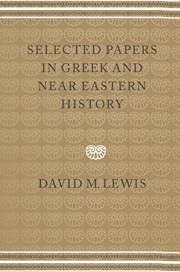Book contents
- Frontmatter
- Contents
- List of plates
- Preface
- Systems of reference
- GENERAL
- ATHENIAN
- 9 Public property in the city
- 10 Cleisthenes and Attica
- 11 Review of J. S. Traill, The Political Organization of Attica
- 12 Review of P. Siewert, Die Trittyen Attikas und die Heeresreform des Kleisthenes
- 13 The Kerameikos ostraka
- 14 Megakles and Eretria
- 15 The Athenian Coinage Decree
- 16 Athena's robe
- 17 The treaties with Leontini and Rhegion
- 18 Entrenchment-clauses in Attic decrees
- 19 Apollo Delios
- 20 After the profanation of the Mysteries
- 21 Aristophanes and politics
- 22 Who was Lysistrata?
- 23 A note on IG i2114 [= i3105]
- 24 The epigraphical evidence for the end of the Thirty
- 25 The financial offices of Eubulus and Lycurgus
- 26 The dating of Demosthenes' speeches
- 27 Law on the Lesser Panathenaia
- 28 The Athenian Rationes Centesimarum
- 29 The chronology of the Athenian New Style Coinage
- 30 Review of M. Thompson, The New Style Silver Coinage of Athens
- NEAR EASTERN
- Bibliography
- Publications of David M. Lewis
- Indexes
9 - Public property in the city
Published online by Cambridge University Press: 15 January 2010
- Frontmatter
- Contents
- List of plates
- Preface
- Systems of reference
- GENERAL
- ATHENIAN
- 9 Public property in the city
- 10 Cleisthenes and Attica
- 11 Review of J. S. Traill, The Political Organization of Attica
- 12 Review of P. Siewert, Die Trittyen Attikas und die Heeresreform des Kleisthenes
- 13 The Kerameikos ostraka
- 14 Megakles and Eretria
- 15 The Athenian Coinage Decree
- 16 Athena's robe
- 17 The treaties with Leontini and Rhegion
- 18 Entrenchment-clauses in Attic decrees
- 19 Apollo Delios
- 20 After the profanation of the Mysteries
- 21 Aristophanes and politics
- 22 Who was Lysistrata?
- 23 A note on IG i2114 [= i3105]
- 24 The epigraphical evidence for the end of the Thirty
- 25 The financial offices of Eubulus and Lycurgus
- 26 The dating of Demosthenes' speeches
- 27 Law on the Lesser Panathenaia
- 28 The Athenian Rationes Centesimarum
- 29 The chronology of the Athenian New Style Coinage
- 30 Review of M. Thompson, The New Style Silver Coinage of Athens
- NEAR EASTERN
- Bibliography
- Publications of David M. Lewis
- Indexes
Summary
The standard books on the Greek city either have no treatment of public property at all or take it for granted in treating public finances. This is an attempt to fill some of the gap. It is concerned mostly with classical Athens and operates with a rather narrow definition, pursuing the key Greek word for ‘public’, demosios. It will emerge in the course of the paper that other forms of communal ownership operate functionally in a very similar way, in that the city can exercise control of their administration and revenues.
In the Appendix, I review some current views about the history of the word demos, and conclude that it can, very early and certainly before the word demosios starts appearing, simply mean the whole citizen body with no programmatic nuance of ‘lower classes’ or implications of democracy.
The earliest relevant appearance of demosios is in Solon fr. 4, the unjust hegemones (leaders) who steal and snatch, sparing neither sacred nor public property (outh' hieron kteanon oute ti demosion pheidomenoi, 12–13). It has been suggested to me that there maybe some elements of persuasive definition here, with a transition from the property of individual members of the demos to that of the demos as a whole, but I incline to think that the lines do establish the concept of public property for Solon's time, as well as the use for it of the word demosios; we may also recall the statement, generally passed over, that Solon's seisachtheia involved the abolition of debts, both private (idia) and public (demosia) (Arist. Ath. Pol. 6.1).
- Type
- Chapter
- Information
- Selected Papers in Greek and Near Eastern History , pp. 60 - 76Publisher: Cambridge University PressPrint publication year: 1997



